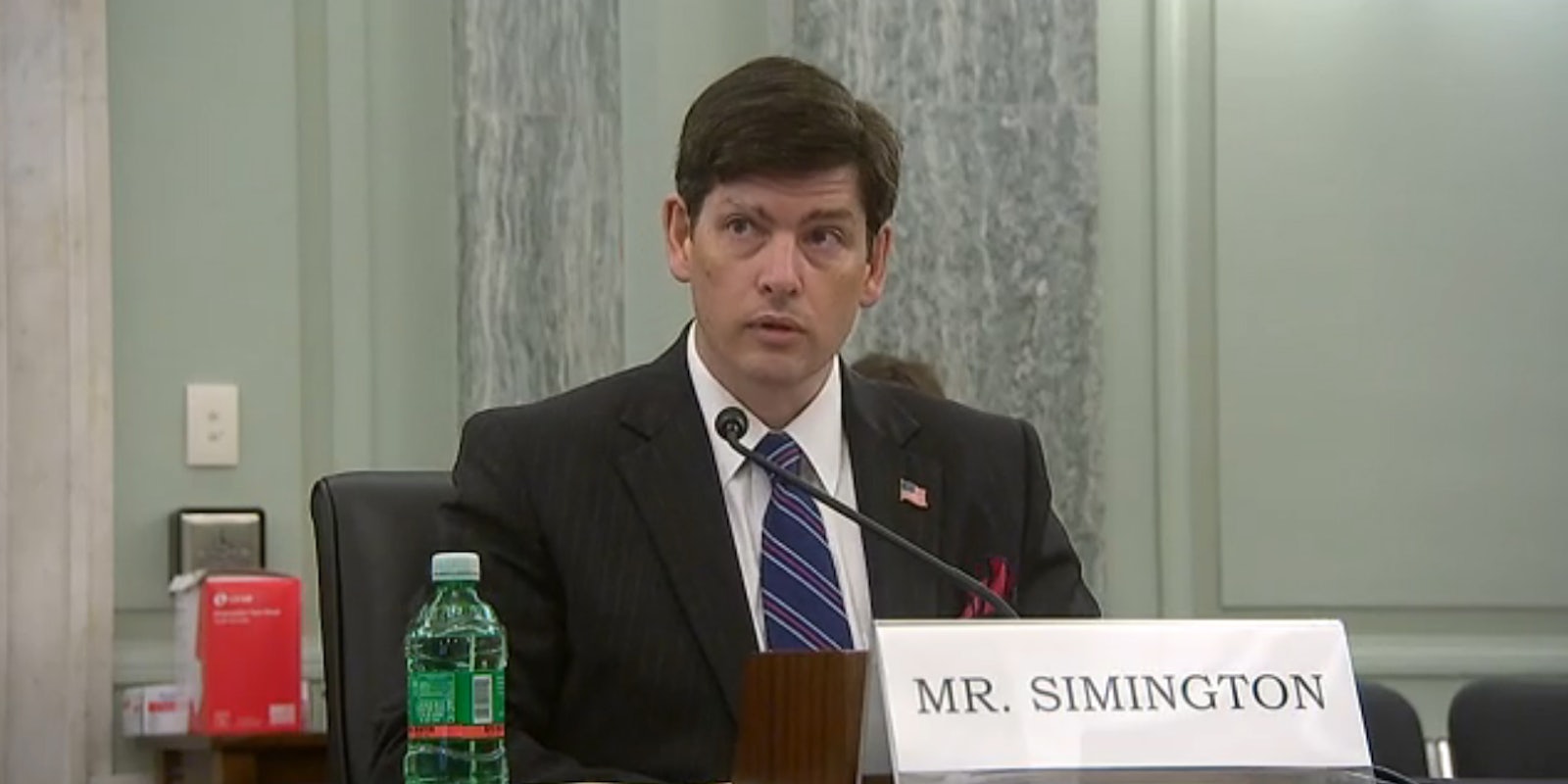Nathan Simington, President Donald Trump’s controversial choice to be on the Federal Communications Commission (FCC), will get a vote next week from the Senate Commerce Committee on whether to advance his nomination to the full Senate.
Simington’s selection to serve on the FCC has been fraught with controversy because of his connections to Trump’s social media executive order that targets Section 230 of the Communications Decency Act.
Section 230 is an important internet law that shields websites from being liable over what is posted on them by users. It’s been called “one of the most valuable tools for protecting freedom of expression and innovation on the internet,” and advocates have warned that changes to the law could have wide-reaching ramifications for the internet. Despite this, the law is a target for reform for lawmakers on both sides of the aisle.
Trump nominated Simington, who currently works for the Commerce Department’s National Telecommunications and Information Administration (NTIA), for the post shortly after withdrawing the nomination of Michael O’Rielly, a Republican commissioner who raised concerns about the FCC’s authority to carry out Trump’s executive order.
At a hearing two weeks ago, Simington insisted that he had a “minor role” in crafting Trump’s social media order at the NTIA.
However, Politico reported on Tuesday that he sent an email to Fox News over the summer trying to have host Laura Ingraham support Trump’s order. In the email, Simington said “any additional support” from Fox News “could help to get the FCC on board more quickly and thereby ensure a freer, fairer social media landscape going into the elections this fall.”
At that hearing, Sen. Richard Blumenthal (D-Conn.) asked Simington whether he would recuse himself from Section 230 votes if his nomination advanced. Simington said agreeing to that would be “premature,” and Blumenthal threatened to put a hold on his nomination.
If Simington advances through the committee vote—which the Senate Commerce Committee announced on Tuesday would be held on Dec. 2—and then passes through a full vote in the Senate, he could put the FCC into a crunch for President-elect Joe Biden.
If Simington’s nomination is approved, and FCC Chairman Ajit Pai steps down from his post ahead of the nomination (which is traditional), it would leave the agency stuck with 4 commissioners, two from each party. If Republicans maintain control of the Senate after the runoff elections in Georgia, they would be able to hold up a Biden nomination to the agency, continuing to leave the agency in a partisan deadlock.
The FCC is supposed to have five members, including the chairman which is chosen by the president. Three of the commissioners are supposed to be from the president’s party, with the other two the opposite party.
That inability to go through any votes that would go down party lines would stall movement on a number of issues that tech advocates have hoped would come with a Biden-backed FCC, including restoring net neutrality—which has been down party lines in past FCC votes.
However, there has been some speculation about whether Simington has the votes to proceed both in the Senate committee and the full Senate, as Politico notes.
With the specter of a tied-up FCC becoming a possibility, tech advocates have pushed back.
“If the intention of the Republican Senate is to just deactivate the FCC and just make it an agency that can’t do anything, that’s horrifying. Right now, there are kids going to parking lots that need access to the internet and they are going to fast food joints for Wi-Fi. If you don’t have a federal regulator involved in addressing these problems in the midst of a national emergency, that’s insanity,” Ernesto Falcon, a senior legislative counsel at the Electronic Frontier Foundation (EFF), told the Daily Dot. “I really hope that is not the intent and the outcome, and I worry about that.”
Falcon, who wrote a blog for EFF arguing against advancing the nomination of Simington, added that there were “perfectly well situated and respectable and thoughtful individuals within the Republican caucus that would do a very good job” other than Simington.
“It is concerning, because the mission of the FCC is more critical than ever. And this nomination seems to be intentionally designed to prevent the FCC from doing its job,” Falcon said.
Similarly, Evan Greer, the deputy director of Fight for the Future, told the Daily Dot the possibility of purposely tying up the FCC was “unethical and absurd.” Fight for the Future has pushed for people to contact senators to vote against Simington’s nomination.
“Everyone knows Nathan Simington isn’t even qualified for the job. This is a deeply cynical play to tie up the FCC for months and prevent the agency’s new leadership from undoing the damage Ajit Pai has done,” Greer said. “This would be unethical and absurd even in normal times, but in the midst of a pandemic where people are more vulnerable to ISP abuse than ever? It’s criminal.”
Read more about the FCC
| Gigi Sohn calls Republican accusations against her a big telecom-led effort to keep the FCC deadlocked |
| FCC says 10 million homes have now signed up for affordable internet subsidy |
| ISPs won’t quit trying to derail California’s ‘gold standard’ net neutrality law |
| FCC agrees to crack down on ‘sweetheart deals’ that restrict broadband choice in apartments, condos |
| Sign up to receive the Daily Dot’s Internet Insider newsletter for urgent news from the frontline of online. |
